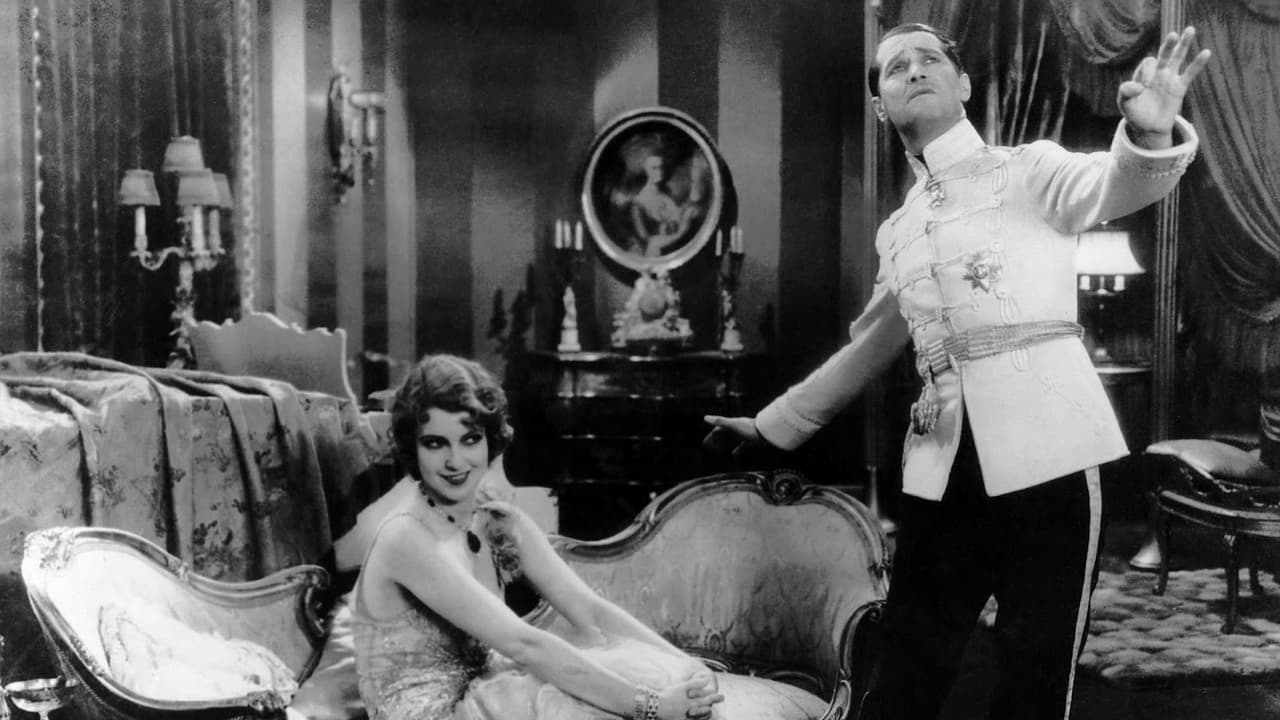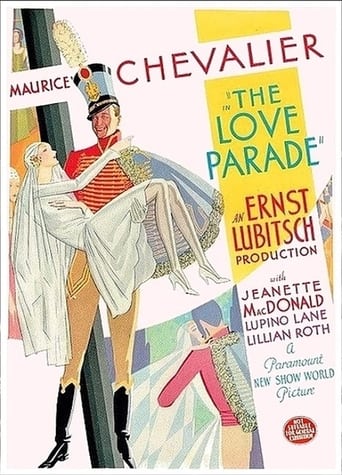KnotMissPriceless
Why so much hype?
Peereddi
I was totally surprised at how great this film.You could feel your paranoia rise as the film went on and as you gradually learned the details of the real situation.
Guillelmina
The film's masterful storytelling did its job. The message was clear. No need to overdo.
Kimball
Exactly the movie you think it is, but not the movie you want it to be.
cstotlar-1
This film did a number of things supremely well, given the limits at the time of the VERY early talkies and a rather bland musical score. First - and perhaps foremost - the songs were integrated into the action and the plot beautifully. Unlike so many other "talkathons" of the time in which the camera stares at the characters' mouths all the time, we follow the characters as they go about their lives normally - while singing at the same time! Lubitsch didn't miss a step here. And although the two quite different styles of singing were in deep contrast, so were the characters! Although the country was about to be invaded by a Puritanical "Code" a bit later - and Prohibition in full swing - the film is in no way whatsoever crude or lewd. Neither was its director who could show more action filming a closed door than most others could depict in an entire film. I enjoyed this romp very much.
Cyke
100: The Love Parade (1929) - released 11/19/1929, viewed 6/10/08.DOUG: I always said that as soon as they released an Ernst Lubitsch box set, I would check it out. As Lubitsch's first sound film, 'The Love Parade' would have closed out the 20's for us. This is my 5th Lubitsch film, and he has yet to disappoint me. Right from the start, Lubitsch has an excellent handle on how to utilize sound, dialogue, and music, but still gets plenty of mileage out of dialogue-free business, such as the opening scene. The two leads spark nearly as much chemistry as they would later in 'Love Me Tonight': Chevalier (in his second sound film) is charming as ever, and Jeanette McDonald (in her first film) is supremely sexy (really!), showing a lot more skin in several scenes than the Hays Code would have likely allowed. I thought the second half of the film lagged quite a bit; once the two are married, it's just a series of scenes of Alfred becoming miserable with his new life, suffering under the soul-crushing set-up of "many duties and no rights." Lupino Lane and Lillian Roth add a lot of cuteness, spunk, and verve to the proceedings as Alfred and Louise's respective sidekicks/hired help; their performance of "Let's Be Common" was my favorite musical number of the piece. Judging by his footwork, I'm guessing Lane came off of vaudeville. Although I enjoyed this movie less than the other four Lubitsch comedies I've seen, I still recommend it.KEVIN: Going back to 1929 we have this royal battle of the sexes, Lubitsch-style! Though not an essential, this movie was definitely worth checking out. The always reliable Maurice Chevalier (in his second sound film), and the lovely singer Jeanette MacDonald (in her first film) star in The Love Parade, Ernst Lubitsch's teasing romantic musical. When a suave ambassador (Chevalier) gets in one too many scandals in his beloved Paris, he returns home to his native Silvania, where he catches the eye of the man-starved queen (MacDonald). But when they wed, he becomes not a king but the "queen-consort," a position with many mundane duties but no responsibilities or power of any kind. That and his lovely new wife is more focused on her queenly duties. Naturally, he finds his new life more than a little unsatisfying. I found the struggle of Chevalier's character to be fresh and appealing, portraying a man who refuses to remain a trophy husband. There were several scenes where it felt as though the gender roles had been reversed, though the scene in the opera house where Chevalier basically taunts MacDonald into submission worried me some. But overall, the irresistible team of Chevalier & Lubitsch definitely met my expectations. The dialogue-free opening scene was a stitch. MacDonald manages to strike the right balance of lovelorn maiden and blue-blooded royal. Lupino Lane and Lillian Roth (who would appear the following year in Animal Crackers) make a great team and provide some fantastic sidekick laughs (and some of the more inventive dance numbers).Last film viewed: Wings (1927). Last film chronologically: The Cocoanuts (1929). Next film viewed: The Divorcée (1930). Next film chronologically: Anna Christie (1930).
writers_reign
It's Lubitsch, it's got songs, what more do you want. Alas, it's also got Jeanette MacDonald and Maurice Chevalier but you can't have everything. It's actually quite good, especially for 1929; okay, the songs could be better but the idea of integrating song and story was innovative and though Mamoulian did it better three years later this was clearly his blueprint - AND he had a score by Rodgers and Hart. Victor Schertzinger was a fine composer and later turned director and Clifford Grey was a competent lyricist so that leaves the story, a twist, one of several at the time, on The Merry Widow, which Lubitsch would film with the same two leads in 1934. It remains a fascinating record of Lubitsch's first talkie and early musical film.
Jerry
Today, this film seems very dated. However, the wit of the writing and direction and the charm of the leading characters makes it still worth watching. The singing is enjoyable, but there are no particularly memorable tunes. The renowned "Lubitsch touch" is evident.

